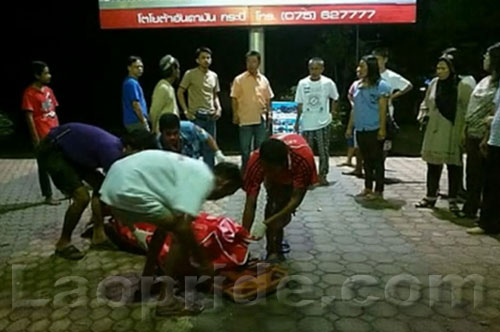Thai police probe deaths of Canadian sisters found dead in hotel room

The bodies of Noemi Belanger and her sister Audrey Belanger
were discovered in a hotel in Phi Phi, Thailand.
A maid found two Canadian sisters dead inside their hotel room on a popular resort island in southern Thailand, police confirmed Sunday, saying that the holidaymakers did not appear to have been murdered and their belongings had not been taken.
Police were working to determine the cause of death of 25-year-old Noemi Belanger and her 20-year-old sister Audrey, whose bodies were found Friday at the Phi Phi Palm Residence Hotel on Phi Phi Island, said police Lt. Col. Jongrak Pimthong.
"Police determined they were dead for about 24 hours prior to that and only found a lot of vomit in the room," he said. The vomit, along with traces of blood on the women's face, could be signs of a toxic reaction, police said. Jongrak said autopsies that would be carried out shortly should provide more clues as to how they died.
He said there was no sign of a homicide, noting that the door had been chained from the inside and the women's belongings were still there.
The officer said investigators from Krabi, on the mainland, were traveling to Phi Phi to check the crime scene and collect more evidence.
Canadian Foreign Affairs spokesman John Babcock confirmed that two Canadian citizens had died in Thailand, but did not provide further details. He said Canadian consular officials in Bangkok were providing assistance to the family and were in contact with local authorities.
Tourists' deaths are not uncommon in Thailand, which saw about 19 million foreigners visit last year. The causes range from road accidents to foul play and drug overdoses.
The police officer said the hotel, where the women checked in on Tuesday, was located in an upscale area of the island, which is known for its partying and as the location where the movie "The Beach" starring Leonardo DiCaprio was filmed.
Thai media earlier quoted another officer, police Lt. Siwa Saneha, as saying the two went out to socialize on the night of their arrival. He said a hotel maid sought to clean their room on Wednesday and Thursday, but did not enter because she believed they were inside.
On Friday, "the maid wanted to check if they wanted to stay at the hotel for another night but didn't hear any response, so the hotel used a spare key to access the room," said Jongrak.
Jongrak recalled a similar incident on Phi Phi Island in May 2009 when two women from the United States and Norway died after suddenly falling ill at a guesthouse, but refused to comment if the two cases shared the same cause of death.
In that case, the victims suffered severe vomiting and stomach pains before being rushed to hospital. Doctors determined the proximate cause of death as dehydration and shock, but it was not known what caused their sudden illness. Two other people with the same symptoms survived.
Another spate of mysterious tourist deaths occurred last year in the northern Thai city of Chiang Mai. Six of the victims - who included women from New Zealand, France and the United States, a Canadian man, an elderly British couple and a Thai tourist guide - were staying at the same hotel in January and February.
The cause of death was not established, though some evidence suggested the use of the chemical spray chlorpyrifos, used to kill bedbugs, may have been responsible.


 Pages: 1
Pages: 1
 Pages: 1
Pages: 1
 Home
Home




